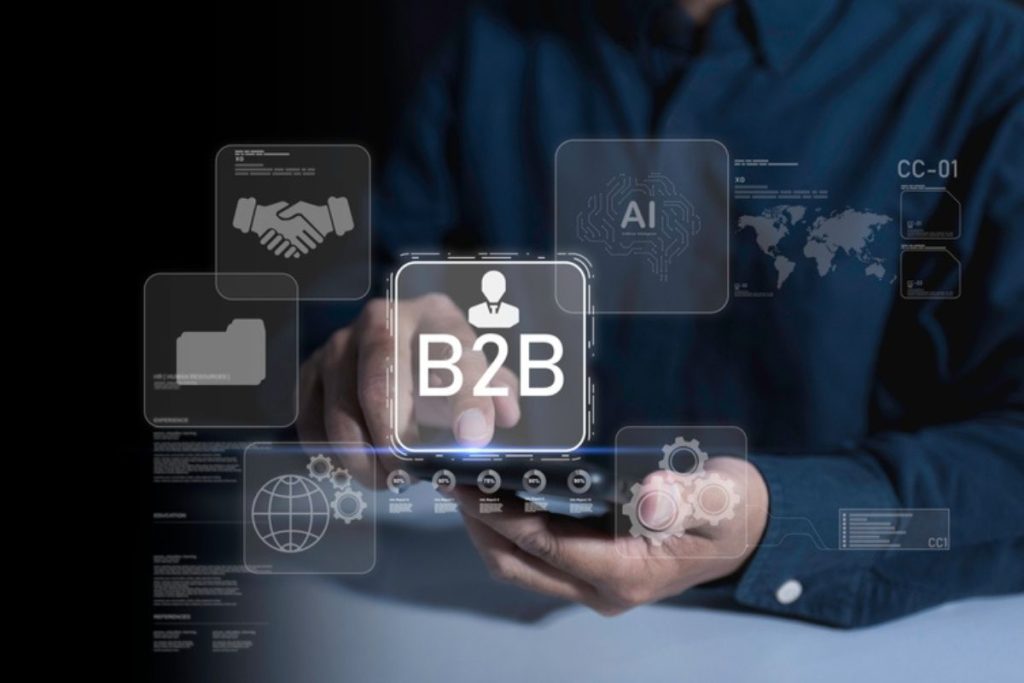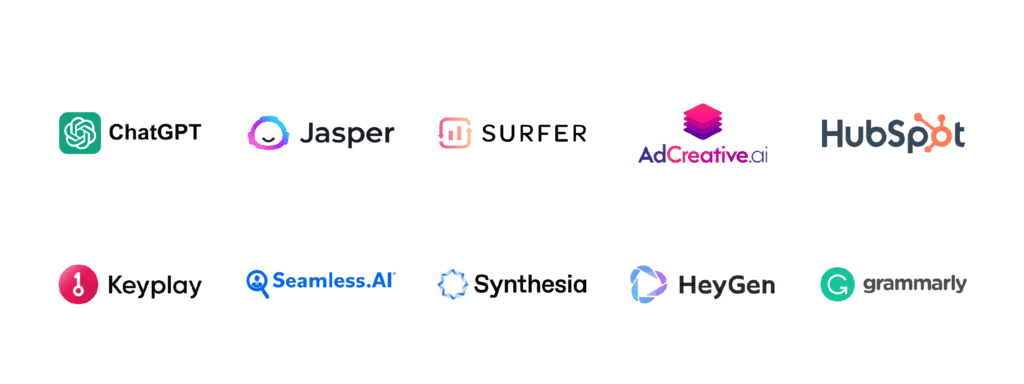How Growth Systems For B2B enhances strategic planning and decision-making
Wiki Article
Transform Your Service: Exactly How AI Automation Is Changing B2B Workflow
AI automation is reshaping B2B procedures in significant means. Business are adopting this technology to streamline operations and boost efficiency. As jobs come to be automated, businesses can concentrate on calculated growth instead than mundane procedures. The effects of these modifications are profound, influencing everything from consumer communications to supply chain administration. Recognizing this change is crucial, as the future of company depend upon the effective combination of AI into day-to-day procedures. What exists ahead in this evolving landscape?Comprehending AI Automation in B2B Context
As companies significantly seek efficiency, recognizing AI automation within the B2B context ends up being important. AI automation describes the application of expert system technologies to simplify and improve organization processes. In B2B environments, this can manifest in different forms, such as automating information access, enhancing supply chain logistics, or boosting supply administration. Organizations leveraging AI automation can decrease operational prices, lessen human mistake, and increase productivity. Furthermore, AI devices can evaluate vast amounts of data to give workable insights, enabling notified decision-making. The integration of AI into B2B operations not only transforms traditional workflows but additionally cultivates agility and scalability, enabling companies to adjust to market adjustments promptly and successfully. Embracing this modern technology is important for remaining competitive in today's digital landscape.Enhancing Client Experience With AI
How can AI transform customer communications in the B2B industry? AI enhances customer experience by providing individualized, timely, and efficient service. Digital assistants and smart chatbots can deal with queries 24/7, making certain customers get instant reactions. Predictive analytics make it possible for organizations to prepare for client requirements, tailoring offerings as necessary. AI-driven platforms can analyze consumer information, enabling for targeted marketing strategies and enhanced engagement. Additionally, belief evaluation devices assess client comments, helping companies adjust their solutions. By automating routine tasks, AI releases up human sources to concentrate on high-value communications, fostering stronger relationships. The assimilation of AI not only improves communication however likewise constructs depend on and loyalty, ultimately raising the total consumer experience in the competitive B2B landscape.Improving Supply Chain Management With AI
AI plays a necessary duty in enhancing supply chain monitoring through predictive analytics and automated inventory control (Minarik AI). By leveraging anticipating analytics, services can prepare for need fluctuations and adjust their operations as necessary. Automated stock systems further boost efficiency by making certain supply levels are preserved, decreasing waste and boosting total efficiency
Anticipating Analytics Benefits
While lots of services encounter obstacles in managing complicated supply chains, anticipating analytics provides a transformative service by leveraging vast quantities of data to anticipate trends and optimize operations. By examining historical data along with real-time inputs, predictive analytics enables companies to recognize patterns and prepare for future needs. This insight enables even more enlightened decision-making, enhancing efficiency and minimizing expenses. Furthermore, businesses can proactively resolve possible disruptions by anticipating supply chain traffic jams and readjusting techniques appropriately. The combination of anticipating analytics not just improves supply management but likewise fosters more powerful relationships with suppliers and clients with timely actions to market changes. Eventually, the fostering of anticipating analytics empowers companies to stay competitive in an increasingly vibrant company setting.Automated Stock Control
As services significantly rely upon anticipating analytics to optimize supply chain operations, automated inventory control becomes an effective ally in this initiative. By leveraging AI-driven technologies, firms can improve accuracy in inventory monitoring, minimize stockouts, and reduce excess supply. Automated systems examine real-time data, enabling organizations to forecast need variations and adjust supply levels as necessary. This not just streamlines order fulfillment but additionally improves cash flow management by decreasing holding expenses. Furthermore, AI can determine patterns in acquiring actions, allowing even more enlightened decision-making regarding supplier relationships and purchase methods. Inevitably, automated supply control not just enhances operational performance however also boosts client complete satisfaction by guaranteeing item accessibility, strengthening its duty as an essential component in modern-day supply chain monitoring.Data-Driven Choice Making Powered by AI
In today's competitive landscape, companies increasingly depend on data-driven decision-making to boost operational performance and calculated planning. Fabricated knowledge plays an essential duty in this makeover by analyzing substantial quantities of data promptly and properly. AI algorithms determine patterns, fads, and abnormalities that human experts could forget, enabling companies to make informed decisions based upon real-time insights - Minarik AI. This capacity permits business to anticipate market changes, enhance resource allocation, and customize their offerings to client demands. Furthermore, AI-driven analytics facilitate risk analysis and administration, ensuring that organizations can navigate uncertainties effectively. By leveraging these innovative tools, organizations not just enhance their decision-making processes however likewise gain an affordable advantage in their corresponding markets, cultivating development and innovationAutomating Recurring Tasks to Increase Productivity
Improving repetitive jobs through automation substantially enhances productivity within B2B operations. By executing AI-driven services, business can remove ordinary tasks such as data access, billing handling, and record generation. This shift enables workers to concentrate on higher-value tasks, promoting imagination and calculated reasoning. Automating these time-consuming processes not just lowers human error yet additionally accelerates workflow efficiency. Furthermore, services can accomplish constant results and enhanced accuracy, which is vital in preserving client fulfillment. The combination of automation tools enables organizations to allot resources better, ensuring that teams can respond promptly to market demands. Eventually, embracing AI for repetitive jobs is a tactical action that transforms operational abilities and drives overall organization growth.Incorporating AI With Existing Service Processes
When integrating AI with existing organization processes, many organizations face difficulties. These difficulties typically originate from an absence of recognizing regarding exactly how AI can complement present workflows. Effective combination calls for a comprehensive assessment of existing procedures to identify areas where AI can include worth. Organizations should likewise guarantee that their groups are geared up with the necessary abilities to leverage AI tools properly - Growth Systems For B2B. Additionally, seamless assimilation depends upon the compatibility of AI innovations with heritage systems. Business often discover it valuable to take on a phased technique, piloting AI applications in details divisions prior to a wider rollout. This method permits modifications based on preliminary responses, assuring smoother shifts and maximizing the potential benefits of AI automation in enhancing efficiency and effectivenessFuture Patterns in AI Automation for B2B Business
As B2B business want to the future, enhanced information analytics is set to play a pivotal function in driving decision-making procedures. Intelligent process automation will certainly additionally become an essential pattern, streamlining operations and boosting performance. These innovations guarantee to improve just how companies run, ultimately bring about more responsive and nimble companies.Improved Data Analytics
While companies increasingly rely on data-driven choices, the function of AI in enhancing data analytics is becoming more necessary in B2B procedures. AI innovations facilitate the collection and evaluation of huge datasets, allowing firms to uncover useful understandings that drive critical preparation. Minarik AI Predictive analytics powered by AI enables companies to forecast market fads and client behavior with greater precision. Furthermore, artificial intelligence algorithms boost data analysis, recognizing patterns that human experts may ignore. This leads to even more informed decision-making and enhanced resource appropriation. As B2B business proceed to accept AI-driven analytics, they can expect improved operational performance, enhanced client experiences, and an one-upmanship on the market. The future of information analytics in B2B pivots on incorporating advanced AI capacities.Intelligent Process Automation
Intelligent Refine Automation (IPA) is positioned to revolutionize B2B operations by perfectly incorporating AI modern technologies with traditional company procedures. This innovative approach combines robotic procedure automation (RPA) with innovative AI capacities, making it possible for companies to enhance effectiveness and accuracy. Companies can automate repetitive jobs, such as data entrance and invoice processing, allowing employees to focus on calculated efforts. IPA likewise leverages artificial intelligence and natural language processing, boosting decision-making with real-time information evaluation. As services progressively take on IPA, they can anticipate significant cost reductions and improved customer experiences. Future fads indicate a growing dependence on IPA for scalability and versatility, placing companies to flourish in an ever-evolving industry. Embracing IPA will be vital for maintaining competitiveness in the digital age.Regularly Asked Concerns
What Industries Advantage Most From AI Automation in B2B Workflow?

How Can Small Companies Apply AI Automation Successfully?
Small companies can implement AI automation properly by determining recurring jobs, selecting ideal tools, integrating services slowly, educating staff, and continuously examining performance to optimize processes, guaranteeing a smooth transition and maximizing effectiveness.What Are the Expenses Connected With AI Automation Execution?
The prices related to AI automation implementation typically consist of software program acquisition, framework upgrades, training team, continuous maintenance, and prospective appointment fees. These expenditures can differ significantly based on the range and intricacy of the automation remedies selected.Just how Do I Determine ROI From AI Automation Initiatives?
To determine ROI from AI automation campaigns, one must examine cost savings, efficiency enhancements, and revenue development versus application costs. Tracking vital efficiency indications with time gives beneficial insights right into efficiency and overall return on investment.What Abilities Are Needed to Manage AI Automation Projects?
Effective management of AI automation jobs calls for skills in project management, information analysis, programming, and understanding AI technologies. In addition, strong communication, problem-solving capacities, and adaptability are crucial for steering the complexities of such campaigns.As businesses progressively seek efficiency, comprehending AI automation within the B2B context becomes vital. The assimilation of AI right into B2B operations not just transforms typical process but also cultivates dexterity and scalability, enabling companies to adjust to market adjustments swiftly and properly. While companies progressively depend on data-driven decisions, the duty of AI in improving information analytics is coming to be much more crucial in B2B procedures - Growth Systems For B2B. Smart Refine Automation (IPA) is positioned to reinvent B2B procedures by seamlessly integrating AI technologies with conventional company processes. Effective administration of AI automation jobs calls for skills in task administration, data analysis, programming, and recognizing AI innovations
Report this wiki page